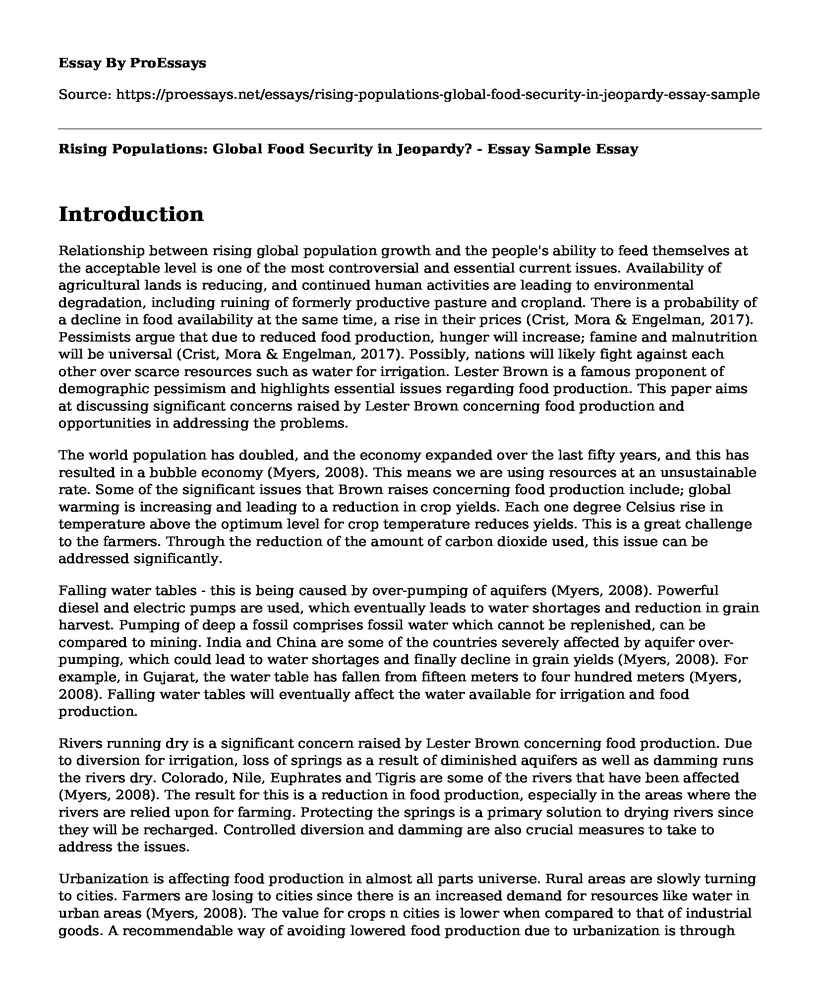Introduction
Relationship between rising global population growth and the people's ability to feed themselves at the acceptable level is one of the most controversial and essential current issues. Availability of agricultural lands is reducing, and continued human activities are leading to environmental degradation, including ruining of formerly productive pasture and cropland. There is a probability of a decline in food availability at the same time, a rise in their prices (Crist, Mora & Engelman, 2017). Pessimists argue that due to reduced food production, hunger will increase; famine and malnutrition will be universal (Crist, Mora & Engelman, 2017). Possibly, nations will likely fight against each other over scarce resources such as water for irrigation. Lester Brown is a famous proponent of demographic pessimism and highlights essential issues regarding food production. This paper aims at discussing significant concerns raised by Lester Brown concerning food production and opportunities in addressing the problems.
The world population has doubled, and the economy expanded over the last fifty years, and this has resulted in a bubble economy (Myers, 2008). This means we are using resources at an unsustainable rate. Some of the significant issues that Brown raises concerning food production include; global warming is increasing and leading to a reduction in crop yields. Each one degree Celsius rise in temperature above the optimum level for crop temperature reduces yields. This is a great challenge to the farmers. Through the reduction of the amount of carbon dioxide used, this issue can be addressed significantly.
Falling water tables - this is being caused by over-pumping of aquifers (Myers, 2008). Powerful diesel and electric pumps are used, which eventually leads to water shortages and reduction in grain harvest. Pumping of deep a fossil comprises fossil water which cannot be replenished, can be compared to mining. India and China are some of the countries severely affected by aquifer over-pumping, which could lead to water shortages and finally decline in grain yields (Myers, 2008). For example, in Gujarat, the water table has fallen from fifteen meters to four hundred meters (Myers, 2008). Falling water tables will eventually affect the water available for irrigation and food production.
Rivers running dry is a significant concern raised by Lester Brown concerning food production. Due to diversion for irrigation, loss of springs as a result of diminished aquifers as well as damming runs the rivers dry. Colorado, Nile, Euphrates and Tigris are some of the rivers that have been affected (Myers, 2008). The result for this is a reduction in food production, especially in the areas where the rivers are relied upon for farming. Protecting the springs is a primary solution to drying rivers since they will be recharged. Controlled diversion and damming are also crucial measures to take to address the issues.
Urbanization is affecting food production in almost all parts universe. Rural areas are slowly turning to cities. Farmers are losing to cities since there is an increased demand for resources like water in urban areas (Myers, 2008). The value for crops n cities is lower when compared to that of industrial goods. A recommendable way of avoiding lowered food production due to urbanization is through setting up large productive areas for agricultural practices.
Lester Brown describes several measures that could address issues regarding food production. Raising water and land productivity are considered to be helpful when addressing these issues (Francis, 2010). Cutting the carbon emissions and responding to social challenges such as high population growth are opportunities that can effectively address the issues in food production.
Conclusion
In conclusion, the issues of reduced food production are becoming common with an increase in population. Several causes to this are human activities and could be addressed to prevent the condition of low food production becoming worse in the future. Although Lester Brown projects these to be experienced in the future, it is necessary to take actions since the issue of food security is a ticking time bomb which will eventually explode if not addressed.
References
Crist, E., Mora, C., & Engelman, R. (2017). The interaction of human population, food production, and biodiversity protection. Science, 356(6335), 260-264. doi:10.1126/science.aal2011
Francis, C. (2010). Plan B 4.0: Mobilizing to Save Civilization. By Lester R. Brown. W.W. Norton and Co., New York, NY. 368 p., paper, $16.95, ISBN 978-0-393-33719-8. Renewable Agriculture and Food Systems, 25(3), 252-253. doi:10.1017/s174217051000027x
MYERS, N. (2008). Plan B 3.0: Mobilizing to Save Civilization, BY LESTER R. BROWN, 384 pp., 23.1 15.5 2.8 cm, ISBN-13 978 0393 330878 paperbacks, US$ 17.00, New York, USA: W. W. Norton & Co., 2008. Environmental Conservation, 35(3), 275-276. doi:10.1017/s0376892908004992
Cite this page
Rising Populations: Global Food Security in Jeopardy? - Essay Sample. (2023, Mar 13). Retrieved from https://proessays.net/essays/rising-populations-global-food-security-in-jeopardy-essay-sample
If you are the original author of this essay and no longer wish to have it published on the ProEssays website, please click below to request its removal:







